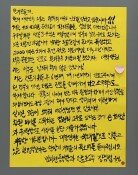The intention behind Kim’s third visit to China
The intention behind Kim’s third visit to China
Posted June. 20, 2018 07:17,
Updated June. 20, 2018 07:17
North Korean leader Kim Jong Un began his third trip to Beijing Tuesday for a two-day visit. Kim’s latest trip came ahead of follow-up negotiations with U.S. Secretary of State Mike Pompeo, in the same way his two previous visits were made right before the announcement of holding the Trump-Kim meeting and Pompeo’s visit to Pyongyang after the inter-Korean summit. The young leader’s trip is apparently intended to brief Xi on the outcome of his summit with Trump and to seek advice for future negotiations. There were also reports that Kim was able to lead Washington and Seoul to suspend their joint military exercises thanks to consultations with President Xi during his second trip to China.
Beijing has long called for a freeze-for-freeze strategy in which North Korea would drop its nuclear program in exchange for the suspension of South Korea-U.S. joint military drills. China has also argued that both the denuclearization of the Korean peninsula and the establishment of a peace regime should be concurrently discussed. Current developments subsequent to the Trump-Kim meeting seemingly show that the solutions suggested by Beijing are well in play, which is why some say that “the real winner is China” in this whirlwind of diplomacy. Moreover, China has been recently leading the movement to lift sanctions on Pyongyang in the border area. Though the United States stresses that sanctions will remain in place until denuclearization is completed, it seems that Beijing has already deviated from the frontline of countries pushing for economic sanctions against the North.
Now with the ongoing peaceful mood with Washington, Pyongyang seems to be thinking that they have a golden opportunity to go beyond the easing of military pressure and induce the lifting of economic sanctions. During the Cold War, North Korea used to acquire practical benefits by conducting equidistant diplomacy with China and the Soviet Union, and now, Kim Jong Un appears to be trying to seek a breakthrough by employing the same diplomatic tactic between the United States and China. Since the Trump-Kim summit, the stance of “maximum pressure” has already waned, and the South Korean government announced Tuesday that it will suspend the scheduled UFG exercise as well as the Ulchi exercise of its own, even though North Korea has yet taken any action towards denuclearization corresponding to the suspension of military drills. Though such measures can be taken back depending on the North’s future attitude, it is not easy to tighten a stance again once it gets loosened. It is also worrisome that the major premise of North Korea’s denuclearization itself may get blurred under such hectic circumstances.
Headline News
- Med professors announce intention to leave hospitals starting Thursday
- Bridge honoring Sgt. Moon Jae-sik unveiled in Pennsylvania
- Chief of Staff Chung tells presidential secretaries to stay away from politics
- US FTC bans noncompete agreements
- N. Korea launches cyberattacks on S. Korea's defense companies







